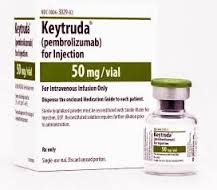Healthcare with Confidence
Keytruda and Immunotherapy Revolution in cancer treatment: The Israeli Breakthrough

Groundbreaking Research from Israel
One of the most promising advances in the global fight against melanoma has been led by Prof. Jacob Schachter, Head of the Ella Institute for Melanoma and Immuno-Oncology at Chaim Sheba Medical Center, Tel Hashomer. His pioneering clinical research helped position Keytruda (pembrolizumab) as a cornerstone in melanoma treatment.
In September 2014, Keytruda was approved by the U.S. Food and Drug Administration (FDA) under an accelerated procedure after showing remarkable results: the drug helped about 50% of patients with metastatic melanoma, with significantly fewer side effects than traditional treatments. This milestone marked a turning point in how cancer—particularly advanced melanoma—is treated.
A New Approach: Stimulating the Immune System
Unlike older treatments that aimed to kill tumors with toxic chemotherapy—often damaging healthy tissue and suppressing the body’s defenses—Keytruda represents a paradigm shift. This innovative treatment uses immunotherapy, a mechanism that empowers the body’s own immune system to identify and destroy cancer cells.
“Keytruda creates a real potential for treating one of the deadliest cancers with minimal side effects and high tolerability,” says Prof. Schachter. “It not only transforms the treatment of melanoma but opens doors for treating many other types of cancer using similar immunological mechanisms.”
Understanding How Immunotherapy Works
Every day, our immune system scans the body to detect and eliminate abnormal cells. In most people, this process prevents cancer from ever forming. However, some cancer cells evolve to evade immune detection, leading to tumor growth.
For many years, scientists struggled to understand why the immune system sometimes failed to stop cancer. The breakthrough came when researchers identified “immune checkpoints”—natural mechanisms that prevent immune cells from attacking the body’s own tissues.
Unfortunately, cancer cells can hijack these checkpoints to protect themselves. Drugs like Keytruda work by blocking these inhibitory signals, or “releasing the brakes”, thereby re-activating the immune response against tumors.
“To enable the immune system to destroy dangerous cells,” Prof. Schachter explains, “we must remove the brakes that suppress immune cell activity. That’s what checkpoint inhibitors like Keytruda do so effectively.”
Results That Reshape Prognosis
According to the FDA:
- 69% of patients treated with Keytruda were still alive one year after diagnosis.
- 62% survived at least 18 months.
These survival rates represent a revolutionary improvement compared to past therapies.
“Only a few years ago,” Prof. Schachter recalls, “treatment options for metastatic melanoma were extremely limited. Chemotherapy had virtually no effect. Early immunotherapy had severe side effects and helped only about 5% of patients.”
Thanks to the biological and immunological therapies developed in the last decade, patients are now living longer and better. While earlier biologics often lost effectiveness after several months, newer drugs like Keytruda provide durable responses and long-term disease control.
Why the Immune System Sometimes Fails—and How We Can Help It
Cancer cells are masters of disguise. They can mimic normal cells and suppress immune surveillance. Over time, the immune system may enter a state of equilibrium with the tumor, neither fully eradicating it nor letting it grow unchecked. This silent battle can last for years—until the tumor gains enough strength to escape immune control.
Immunotherapy is designed to reawaken the immune system, allowing it to recognize and attack cancer cells that had previously evaded detection.
Prof. Schachter emphasizes:
“The immune system isn’t broken—it’s being bypassed. Keytruda helps it see the enemy again.”
Why Keytruda is Different
Keytruda is part of a class of drugs called PD-1 inhibitors, which block the interaction between cancer cells and immune checkpoint proteins. It is only the second drug of its kind but is distinguished by:
- Rapid action: Tumors may shrink within weeks.
- Fewer side effects than earlier checkpoint inhibitors.
- Broad effectiveness: It is now used for multiple cancer types.
Israel: A Global Leader in Melanoma Treatment
According to the International Agency for Cancer Research, Israel ranks among the top countries in the world for melanoma incidence, especially among men and women exposed to high UV radiation.
Despite this, Israel has become a global leader in developing and implementing cutting-edge melanoma treatments.
Clinical data collected from Sheba Medical Center, Hadassah, and other major hospitals shows that hundreds of patients—including those who exhausted all conventional options—are now living normal lives with long-term disease management thanks to Keytruda and related therapies.
Precision Medicine and Early Diagnosis
Israeli centers now offer:
- Digital skin mapping for early melanoma detection.
- Genetic and oncological testing to detect specific tumor markers.
- Personalized treatment protocols using oncomarker analysis to determine the best immunotherapy drug (e.g., Keytruda) for each patient.
This individualized approach allows Israeli oncologists to match patients with the most effective treatment for their specific cancer profile.
Conclusion: A Hopeful Future for Melanoma Patients
Keytruda and the Israeli-led immunotherapy revolution have opened a new chapter in cancer treatment. With fewer side effects, improved survival, and the ability to personalize treatment based on each patient’s immune and genetic profile, melanoma is no longer the hopeless diagnosis it once was.
Prof. Schachter sums it up:
“We now have dozens of success stories—patients once considered untreatable who now lead full, active lives.”
If you or someone you know has been diagnosed with melanoma, consulting with Israeli specialists may provide access to some of the most advanced and hopeful treatments available today.





